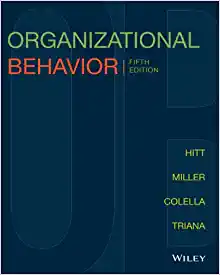Is there ever a point in our lives when we fully understand how and why we behave
Question:
Is there ever a point in our lives when we fully understand how and why we behave the way we do? It remains a classic open question. This assessment is one of many ways to accumulate answers toward this goal. Its focus on the Big Five should provide a memorable gross measure to relate to other self-discoveries and help learners become more mindful of how their personalities tend to line up within organizations of people important to their lives and livelihoods. It will be memorable, that is, if learners take a moment to do something with what their scores on the Big Five seems to be saying about their personalities. Here is a suggested activity to enhance learning value.
Questions:
1. “What sort of person do you think I am?” is the title of this moment to ponder the meaning of this assessment.
2. The experiment is to seek a few moments with at least three people who know them, preferably a fellow student, a co-worker, a family member or friend, even a boss or teacher. They tell this person they are studying how personality works in forming relationships important to keeping an organization running well. They seek candid feedback on this question: What sort of person do you think I am?
3. Ask learners to complete the assessment privately.
4. Have them chart a profile of the relative strength of their five traits, ranging from 1-5 on each. This should reveal that some traits are “more like me” than others.
5. Ask them to keep this profile private for a day or two and conduct a personal experiment.
6. Before they ask the first person, suggest they jot down their own answers to this question.
7. They should look for threads that run through these answers from several sources. Then, compare these impressions with what the Big Five Personality Assessment is telling them. Do others see me in ways predicted by my self-assessment scores? How do my self-perceptions compare with both the assessment profile and what these people have said about me?
8. You may leave the exercise at this point, making private use of the results of their experiment, or give them a chance to report and discuss their findings. This can be done as a writing assignment, team discussion, or both. What have they learned about learning about themselves? How might this new knowledge help them in their organizational life?
Step by Step Answer:






